- The tutorial action plan (PAT) will offer personalised monitoring for each student from the first year and throughout their training period
- PAT tutors promote proactive tutoring and offer emotional support to prevent students from dropping out and to guarantee academic success
- UVic-UCC’s goal for the 2025-2026 academic year is for all centres to have started to introduce PAT in all bachelor’s degrees
By the 2025-2026 academic year, all University of Vic - Central University of Catalonia (UVic-UCC) centres must have started to implement the tutorial action plan (PAT), a comprehensive service to support students that the University wants to offer throughout the time that a person is linked to the institution, from the moment they enrol for the first time, until they join the UAlumni collective. After some previous experiences, pilot tests were started in the 2024-2025 academic year in several faculties and centres, with the expectation that PAT will be gradually extended throughout the University, until it is fully implemented in the coming academic years.
M. Àngels Pinyana, Vice-Rector for Academic Affairs at UVic-UCC, explains that one of the essential elements of the plan is that it must consider the diversity of the students and that of the academic centres that have to apply the plan. She noted that each centre, according to its needs and its students’ characteristics, should design student-centred support programmes that take into account the personal and academic situation of the students, and the environment or the centre in which they study. She added that, in this respect, the tutorial action plan is an essential tool to prevent students from dropping out of their studies, which generally occurs in the first years of a university degree. For this reason, the priority in the implementation of the plan is to get it to students in their first academic years.
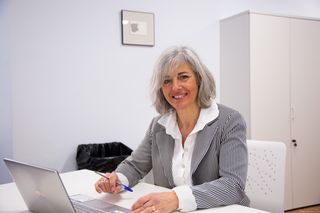
Permanent contact with the student
The introduction of the PAT at the University does not just mean offering tutorials in studies, since tutorials have always been provided. Instead, it entails systematising their implementation in the various degrees. It also represents putting into practice "the way we manage students at UVic-UCC throughout their University journey, putting them at the centre, and allocating a lot of effort and resources to this." This is done by assigning a tutor to each student and defining periodic individual or small group meetings, so that personalised monitoring can be carried out.
Tutorials are systematised in a different way in each centre, but some recommendations have been established by the Office of the Vice-Rector for Academic Affairs, such as the indication that each tutor is in charge of a maximum of twenty students. Another of the priorities is that each tutor is responsible for monitoring the students assigned to him/her throughout their time at the university. "We understand," explained Pinyana, "that tutors must know their students and become a figure that is close to them, so that this support year after year can show the student’s progression, to fully understand it and generate a climate of trust.” During the tutorials, added the vice-rector, "personal and even confidential aspects are discussed, and for the student it is better that the tutor is always the same person.” For all these reasons, the teaching staff who act as tutors are assigned a few hours of work on this task in their teaching assignment.
The aim of the PAT is for each student to have a specific tutor throughout their university journey, someone with whom they can discuss academic and personal aspects
Despite this common context for the application of the PAT, each centre can make the adaptations it considers necessary to offer the best possible support to students. Thus, some centres assign ten students to each tutor, or designate as tutor the course coordinator or one person for an entire group. There are other centres that change the person who monitors the student each year. In any case, however PAT is introduced, the goal is for each University student to have a specific person as a tutor, so that "if they have any difficulties or issues to resolve, they know that they can turn to the tutor.”
Proactiveness in tutoring
Another of the objectives of the UVic-UCC PAT is that meetings with tutors should not just be organised when there is a problem. Instead, the tutor is the person who facilitates the contact, who "generates spaces to be able to talk with the students and let them decide if they want to use these spaces or not." In fact, it should be clear that tutorials are voluntary and that no student is obliged to attend. The aim, stated Pinyana, is to offer students this opportunity. It would be ideal, she explained: "for there to be a middle ground and for both parties to want to meet.”
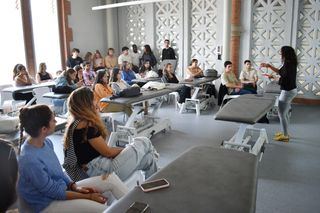
As part of the PAT, other support tools are offered to students to address pedagogical problems (such as dyslexia or dyscalculia), psychological or psychiatric problems. This is a much more specialised service, which is not provided by the tutor but by a professional linked to the psychological care and support services for students in each centre. Tutorials can help to identify people who need these tools or who could benefit from them, and tutors may suggest that students use this service.
Develop student loyalty from the outset
Students are supported in the institution from the moment they first arrive at UVic-UCC, at which point, as Pinyana noted, "we already work to make them feel supported, we show them the facilities, and we invite them to informative sessions about their time at the University.” During a bachelor’s degree, all the support is provided through tutorials and through practicums. In addition to their regular tutor, students have a designated practicum tutor, who they can also turn to if they complete their practicum abroad. In the final stage of their studies, the support, which is a key factor for student loyalty, focuses on the area of job opportunities and academic advice to continue training and specialising in their professional field.
PAT indicators
To monitor the implementation of PAT and the fulfilment of its objectives throughout the UVic-UCC, some indicators have been established. These include the number of university degrees in which it is being deployed, the number of centres, and the number of students it reaches, or the sessions and tutorials held at each centre. In addition, data will be collected on the satisfaction rate of students and teachers. For this purpose, the creation of a student focus group is planned so that students can can evaluate, at the end of this academic year, their experience of the tutorials. The aim is to obtain first-hand information on how the PAT should be implemented, based on the opinions of its beneficiaries - the students.
In addition, the UVic-UCC tutorial action plan connects with and goes beyond the qualitative requirements established by the Quality Assurance Agency for the University System in Catalonia (AQU Catalunya) in terms of student support.
The tutorial action plan at UVic creates a common umbrella and provides tools and resources for the existing support programmes in each faculty
This year, over 1,600 students from UVic's four faculties will have participated in the tutorial action plan (PAT) that the campus is implementing in agreement with the Office of the Vice-Rector for Academic Affairs. However, academic, personal and career guidance support for students on this campus is not new. The first faculty to implement a programme of these characteristics was the Faculty of Science, Technology and Engineering (FCTE) in the 2009-2010 academic year. In the course of the following years, other centres have been developing their own mentoring models.
The dean of the FCTE, Malu Calle, explained that from the outset "we wanted the tutor to be a specific figure who supports the student throughout his or her university life, to help to resolve doubts about the learning process, to improve performance and to prevent people from dropping out.” Fifteen academic years later, on their first day, all students in the faculty are assigned a tutor with whom they will have, on average, three meetings per year or more if one or the other deems it necessary.
In addition, six years ago the same faculty developed a computer application to continuously and effectively monitor each student. This computer tool, which has been fine-tuned, is the channel that the tutor uses to record the meetings and the conclusions derived from them, consult academic results, interact with the lecturers and make referrals to specific services, such as the student support service, thus ensuring the maximum confidentiality and traceability of each action.
Moreover, the computer application was the starting point to launch, this year, a cross-cutting tutorial action plan for the four faculties of the Vic Campus. As explained by Carles Parés, assistant to the Office of the Vice-Rector for Academic Affairs for Students and the Community, this "establishes a common framework that each centre adapts, based on the model it already has in place and its own situation.”
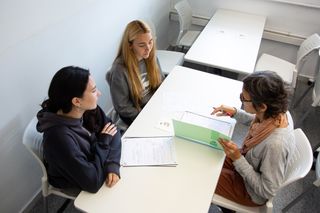
In the Faculty of Business and Communication Studies (FEC), for example, this academic year the first-year journalism students enter the new PAT. Depending on the degree, in this faculty the tutors may be the same over the four years of studies or they may change every academic year. Whether one or the other formula is used, in individual tutorials, group sessions or coordination with delegates, “the aim is for the tutor to know the specific characteristics of the academic year, to be seen by each student as someone close to them and, at the same time, to respond at all points to students’ concerns, which change from the first year, when they enter the university world, to the fourth, when they look towards the world of work,” explained Josep Burgaya, dean of the FEC.
This year, the Faculty of Education, Translation, Sports and Psychology (FETEP) is conducting a pilot test with first-year students of Physical Activity and Sport Sciences (CAFE), but it also has a plan of its own which, in the words of the dean, Mila Naranjo, has three main pillars: "The initial welcome and support throughout the first year to get to know the services, activities and dynamics of the university; the combination of group and individual tutorials to promote the social cohesion of class groups without neglecting personalised support; and the sessions on ‘After graduation, what?’ aimed at final year students.”
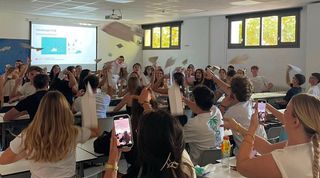
Finally, this academic year, the Faculty of Health Sciences and Welfare (FCSB) has introduced a mentoring model for first-year students of all degrees. In this centre, where the number of students per academic year is usually higher, a group tutoring system has been chosen, in which “each class has the figure of a specific mentor, who supports the students so that they adapt to the university environment, successfully pass all subjects and receive academic and personal guidance,” explained the dean, Míriam Torras. The coordinated work between mentors and lecturers takes place in individual sessions, if necessary.
The implementation of the PAT at UVic, concluded Carles Parés, will gradually create a common umbrella and bring together the initiatives that each faculty was already undertaking in this area. But not only that: "It will highlight the support that many teachers already provided in a more informal way, and often under their own initiative, and of which there was no evidence.” According to Parés, this common model will allow "more tools to be provided and new channels opened to transmit the student care that was already being offered, to recognise work that teachers were already doing and to strengthen the model of personalised support, which is a hallmark of UVic.”
More than 2,000 students have benefited from the tutorial action plan at the Manresa Campus
The Bages University Foundation drew up its first tutorial action plan (PAT) in 2009. The person who was in charge of this, the current vice-rector of the Manresa Campus, Sílvia Mas, said that this commitment was made “to put the student at the centre and to ensure that each student gets the most out of their time at the University.” That first plan, which has been developing over the years, already provided personalised support throughout studies.
Constant contact enables early detection of problems that could lead to a student dropping out of their studies
On the Manresa Campus, the PAT envisages the assignment of a tutor or mentor who supports students throughout their studies with the aim of "activating their full potential and making their abilities shine.” The tutor is the student's point of reference and is responsible for referring him/her to a professional from another field if the situation requires it. Constant contact enables “early detection of problems that could lead to a student dropping out of their studies.”
The UManresa PAT starts from each individual case, and is adapted to each student and each academic stage. For this reason, explained Sílvia Mas, it is different in the first year, when more work is done on integration, than in the second, third or fourth year of the degree, when the tutoring work focuses more on guidance regarding the choice of optional subjects, placements or international mobility.
In the first year, the UManresa protocol states that each student has three meetings with their tutor. The first, at the beginning of the academic year, is to introduce the tutoring system and resolve doubts. The second meeting takes place on completion of the first semester, to assess it and prepare for the next semester. At the end of the academic year, student and tutor meet again to assess overall academic performance and to prepare for the second year.
In the second and third years, the tutor is available to the students to provide personal support for those who request it. In addition, if the tutor perceives that academic performance has dropped or any problem is detected, he/she proposes an individual meeting. At the end of the academic year, another meeting is held to assess the year and guide students on the next one.
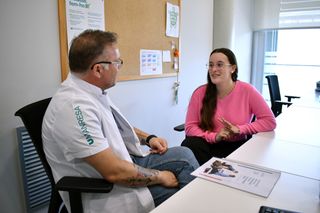
During the final year of undergraduate studies, there is no established protocol regarding the number of meetings. As in the second and third years, the tutor offers certain office hours for students who want to have individual tutorials. In this year, the PAT has an activity to conclude the bachelor’s degree training stage, to work on professional guidance or postgraduate training and promote the continuity of the relationship with the University through the Alumni programme.
With regard to new students in their first year, in the 2023-2024 academic year, the tutorial action plan reached 559 bachelor’s degree students, 33 master’s degree students and 106 advanced vocational training course students. For students in other years, the PAT reached 1,540 bachelor’s degree students and 86 vocational training students.
Elisava incorporates a new app into the tutorial action plan to improve student monitoring and support
The tutorial action plan (PAT) at Elisava was implemented in the 2021-2022 academic year with the start of the Design and Engineering degrees. This plan is adapted to the UVic-UCC model but had already been implemented in degrees prior to Elisava’s entry into the university federation. During the 2024-2025 academic year, improvements have been introduced to better adjust the plan to the reality of the studies, the university community (students, and teaching and research staff) and classroom needs, in accordance with the Quality Improvement Plan.
The PAT is part of the Tutorial Guidance and Action Plan (POAT), which systematises information and guidance activities to support students from the start of their studies to their employment. This plan includes advice provided throughout the academic journey: from the presentation of the training offer to the choice of subjects, distinctions, international mobility, external internships and the management of the final year project (TFG). Contact is also maintained during the postgraduate stage through Elisava Alumni and job opportunities. This academic year, 2024-2025, the plan will reach 1,087 students, with the support of 98 tutors.
The PAT focuses on academic and personal support of students to guarantee their academic success. Tutors offer personalised support to address situations that may affect academic performance, such as personal or family problems, special educational needs, compatibility between studies and high-level sport, temporary leave or dropping out of studies. In addition, academic monitoring is offered, especially in cases of insufficient performance, with the aim of facilitating academic progression and compliance with attendance regulations.
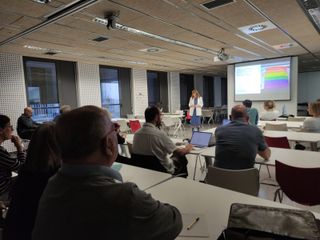
Communication between student and tutor is two-way and can be initiated by either party depending on needs
Finally, work is being done on the development of a web application so that all the academic and welfare information on tutored students can be recorded and managed, to guarantee maximum data confidentiality. This tool facilitates the management of tutorials, the sending of messages, the organization of the calendar and access to materials. In addition, students will be able to request tutorials and receive notifications through the Elisava Life app.
The medicine tutorial action plan covers specific preparation for the MIR
The programme includes mentoring, which is carried out by mentor tutors, who are lecturers with experience and an interest in tutoring. This support begins in the first years of the bachelor’s degree, especially in cases where academic or emotional needs are detected. Often, the beginning of university life can be a period of adaptation, and mentor tutors offer follow-up and recommendations to those students who have difficulties in adapting to new study or assessment methods. From the third year, each student is assigned a mentor tutor, who supports them until the end of the degree. This support includes both academic tutoring, with continuous assessment of clinical practices, and mentoring, which guides students in their academic and professional pathway, helping them to get the most out of their studies and adapt to the healthcare environment. Tutors are also attentive to possible personal or academic needs and refer students to available resources, such as the Academic Performance Optimisation Programme, the MIR Preparation Programme or psychological and emotional care services.
The PSE-FM includes the Academic Performance Optimization Programme, which aims to help students adapt to the educational model of the bachelor’s degree and improve their study techniques. This programme offers group tutorials, to work on specific aspects such as study methodology for clinical cycles or examination techniques. In addition, students can request individual tutoring if they need help to improve their academic performance, or follow the recommendations of PSE-FM to receive more personalised monitoring.
PSE-FM includes group and individual tutorials to work on the study methodology and exam techniques
Another element of the PAT at the Faculty of Medicine is the House Officer (MIR) Preparation Programme that was implemented in the 2020-2021 academic year. This programme supports students during the six years of the bachelor’s degree, with the aim that they reach the MIR exam with maximum confidence and certainty. Throughout the bachelor’s degree, students progressively practice the multiple choice exam format, which is very similar to that of MIR, and participate in seminars designed to perfect the exam technique. Exam simulations are held in the fifth year, which allow each student's strategy to be evaluated before a real exam. Finally, in the sixth year, specific tutorials are provided to guide students in the final preparation of the exam.
